
Dieter Salomon is a German politician of Alliance '90/The Greens who served as mayor of Freiburg im Breisgau for two terms from 2002 until 2018.

The University Library Freiburg is the library of the University of Freiburg. As an academic and research library, it caters to students and staff of the University of Freiburg, the University of Education Freiburg, the Catholic University of Applied Sciences Freiburg, and the Protestant University of Applied Sciences Freiburg. The library is open to interested members of the public as well.
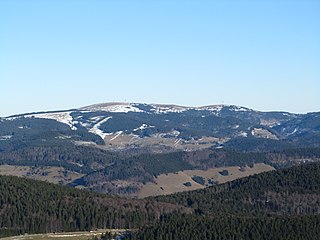
At a height of 1,448.2 m above sea level (NHN), the Seebuck is the second highest mountain of the Black Forest after the Feldberg. It is located in the German state of Baden-Württemberg.

The Freiburg–Colmar railway was an international railway that formerly connected Freiburg im Breisgau, in the German state of Baden-Württemberg, with Colmar, in the French department of Haut-Rhin. The line crossed the river Rhine on a bridge between Breisach and Neuf-Brisach. Since that bridge was destroyed in 1945, the line from Freiburg has terminated at Breisach, and this stretch of line is now commonly called the Freiburg–Breisach railway, or the Breisacherbahn. The section from Freiburg to Breisach was completed in 1871 and the remainder in 1878.
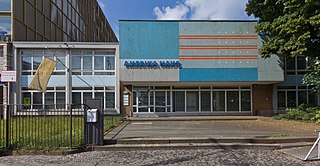
The America House is an institution developed following the end of the Second World War to provide an opportunity for German and Austrian citizens to learn more about American culture and politics, and engage in discussion and debate on the transatlantic relationship. Run by the American government until 2006, Amerika Häuser were located in Frankfurt, Berlin, Heidelberg, Munich, Vienna and other cities. During the Vietnam War, German student protests in Berlin often took place in front of the America Haus.

The Freiburg im Breisgau tramway network is a network of tramways that forms part of the public transport system in Freiburg im Breisgau, a city in the federal state of Baden-Württemberg, Germany. Established in 1901, the network has been operated since its foundation by the company now known as Freiburger Verkehrs, and powered by electricity. The tramway network currently has five lines. The expansion of the tram network since 1980 has served as an example of the "renaissance of the trams" in Germany. As of 2021, 76 trams were available for regular use: 2 of these were high-floored, 36 partial and 36 low-floored. Almost the entirety of the network is located within Freiburg's urban area; only a few metres of the balloon loop at Gundelfinger Straße are located outside the boundary of Gundelfingen to the north of Freiburg. In total, the trams serve 20 out of the 28 districts in Freiburg.

Rastatt Fortress was built from 1842 to 1852. The construction of this federal fortress was one of the few projects that the German Confederation was able to complete. The fortress site covered the Baden town of Rastatt and, in 1849, played an important role during the Baden Revolution. It was abandoned in 1890 and most of it was eventually demolished.
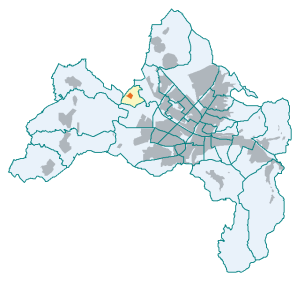
The Mundenhof is located on the western edge of Freiburg im Breisgau, and is the smallest district in Freiburg, with only 46 residents. The zoo on the grounds of the Mundenhof is well-visited. The municipal garden center is also located on the grounds. The Mundenhof is one of many Green Spaces in Freiburg, which present a major factor in its reputation as a green city.
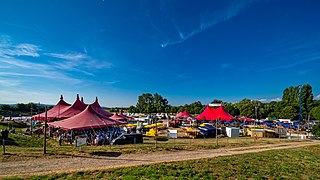
The Zelt-Musik-Festival (ZMF) has taken place every June and July since 1983 in Freiburg im Breisgau, Germany. It lasts three weeks and counts up to 120,000 visitors each year. The program is very broad. There is music, art, theater, cabaret and sport in different tents and on open-air stages. According to the organizer it is the biggest and oldest music festival in Baden-Württemberg. Over the years, more than 600 regional and international artists offered a diverse program consisting of classic, jazz, rock, pop and world music, cabaret and children's program. Also, many newcomers have been promoted.
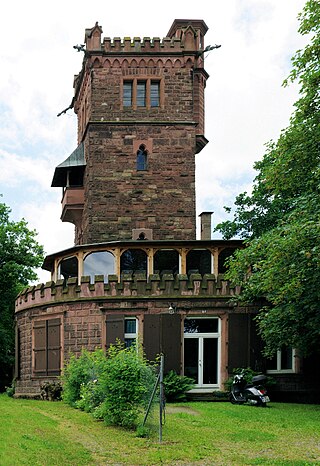
The Lorettoberg, also known as Josephsbergle in Freiburg, is a mountain ridge in the South-West of the Wiehre district in the city of Freiburg im Breisgau in Germany. The mountain, with its elevation of 384.5 meters (1,261 ft) above sea level, is wooded at its peak. It divides the district Unterwiehre-Süd and borders the Vauban district in the West. 500 meters (1,600 ft) north of the "peak" there is a high spur 348 m (1,142 ft) above sea level, next to which the eponymous Lorettokapelle is located. The name derives from Loreto, the second biggest Italian (Mary-) pilgrimage destination, after the St. Peter's Basilica in Rome. The Schloss-Café is located at the top of the mountain making the Lorettoberg a popular destination for a getaway, strolling and a local recreation area.

Freiburg im Breisgau's parks, green spaces, recreational facilities, playgrounds, roadside greeneries and the Mundenhof add up to an area of 397 ha (3.97 km2), which corresponds to 18.05 m2 of green space per Freiburg citizen. On average, major cities in Baden-Württemberg have 22.66 m2 green space/citizen. However, there is an area of 2600 ha (26 km2) of forest in the close proximity of Freiburg as well as additional recreational area like the Rieselfeld district. The majority of the green spaces came into existence from the 1960s on.

The Whale House is a late Gothic bourgeois house in the old town of Freiburg im Breisgau, Baden-Württemberg, Germany and is under conservation. The building is currently used by the Sparkasse Freiburg-Nördlicher Breisgau bank. It is part of a complex which, in the past, was made up of 17 separate buildings. The front wall of the house opens onto the Franziskanerstraße, whilst the rear is on the Gauchstraße, near Kartoffelmarkt square.

Stephan Burger is a German Roman Catholic clergyman. Since 2014 he has been Archbishop of Freiburg and Metropolitan Bishop of the Ecclesiastical Province of Freiburg, succeeding Robert Zollitsch. His younger brother Tutilo Burger has been archabbot of Beuron Archabbey since 2011.

The Colombischlössle is a manor house in the city centre of Freiburg im Breisgau where the eponymous archaeological museum is situated.
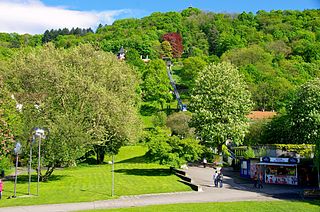
The Stadtgarten of Freiburg is a 2.6 ha park within the Neuburg district. It has an old tree grove and a large rose garden, and lies between the Leopoldring, Jackob Burckhardt, Ludwig and Mozart streets near Freiburg's city centre. It is connected to Karlsplatz via the Karlssteg footbridge, which is made from pre-stressed concrete. Since 2008 the Schlossberg Tram, an inclined elevator, leads up to Schlossberg. It replaced the Schlossberg Cable Car built in 1968.

The Platz der Alten Synagogue is a square in Freiburg, Germany. With a size of 130 square metres, it is the second largest square in the city after Minster Square. The square is named after the old synagogue, which was destroyed during the Kristallnacht in 1938. The synagogue had been built in 1869/1870 to the southwest of today's location of the square.
Hans Heinrich Eggebrecht was a German musicologist and professor of historical musicology at the Albert-Ludwigs-Universität in Freiburg.

The Europa-Park Stadion, also known as the Mooswaldstadion by fans, is a football stadium in Freiburg, Germany. It primarily serves as the home stadium of SC Freiburg, replacing the club's former home, the Dreisamstadion. It is located in a part of the city called Brühl, immediately to the west of Freiburg Airport.

The Seepark Student Quarter, which is also often called “StuSie”, is Freiburg's biggest student quarter. It is located in Freiburg-Betzenhausen at Seepark and accommodates about 1.800 students in 25 buildings.

The village Günterstal is the southernmost district of Freiburg im Breisgau. It is located in the so-called Bohrer-Tal area at the foot of the 1284 metre-high Schauinsland in the Günterstal district of the Black Forest. Due to this, Freiburg prides itself on being Germany's highest city. Günterstal has more than 2,000 inhabitants and is separated from Freiburg by a two-kilometre-wide meadow, the "Wonnhaldewiesen". The village was incorporated into Freiburg in 1890. The southern neighbouring municipality is Horben.




















